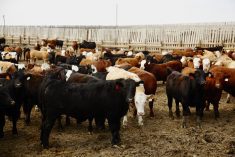Focusing on the negative can come easy, especially after almost two years of challenges. But I’m an optimist at heart and try to focus on the bright side of things — the opportunities that will set up our industry for future success. There’s no doubt that trade is one of our biggest successes.
The past year was another banner year for Canadian beef exports. It marked the sixth year in a row of Canada hitting record export values. This highlights that our long-term investment in market access advocacy pays significant dividends. We are proud to see this trend continue, and more high-quality Canadian beef being enjoyed at dinner tables around the world. Our priority is to grow our market share in existing markets, while working to gain access to new markets. Diversification is a key consideration of our market access strategy.
Read Also

The Canadian Cattle Association’s international advocacy efforts
Global ag policies affect Canadian food policy, so the Canadian Cattle Association participates in international and domestic forums
Another important consideration that can help grow our exports is Canada attaining bovine spongiform encephalopathy (BSE) negligible risk status from the World Organization for Animal Health (OIE) in May 2021. With this new status, the Canadian Cattlemen’s Association (CCA) is working alongside the Government of Canada to remove the remaining BSE-era market access restrictions, such as updating Canada’s export certificate with South Korea, moving to the short list for specified risk materials and the CAN brand on feeder cattle going south.
In December 2021, Canadian beef exports to China, the Philippines and South Korea halted temporarily following the Canadian Food Inspection Agency’s notification to the OIE about a confirmed case of atypical BSE. The detection of an atypical case does not affect Canada’s BSE negligible risk status, nor should it further interrupt trade flows. In January, both South Korea and the Philippines lifted their temporary suspension on Canadian beef imports. We are continuing to work with the Government of Canada to regain market access to China.
We are also keen to attain access to new markets through the negotiation of the Canada-U.K. Free Trade Agreement, expansion of the Comprehensive and Progressive Agreement for Trans-Pacific Partnership (CPTPP), as well as trade negotiations with the Association of Southeast Asian Nations (ASEAN) and Indonesia.
The Asian region is expected to hold the largest growth potential in demand over the next 25 years and securing further access to these markets through CPTPP remains a priority. We are advocating for further expansion of the CPTPP, subject to review of specific country barriers and potential for beef trade.
CCA was also pleased to see trade negotiations launch last year with the ASEAN countries and Indonesia. Canadian beef producers are eager to explore future growth opportunities in new markets and look forward to the ability to increase trade into ASEAN countries that are not part of the CPTPP, namely Indonesia, the Philippines and Thailand.
Another key priority on the trade front is addressing market access challenges in current free trade agreements that limit our trade potential.
When the Canada-European Union Comprehensive Economic and Trade Agreement (CETA) came into provisional effect in 2017, there was great promise for growth in Canadian beef exports. Since that time, we have seen imports from the EU significantly outpace Canadian exports into their market. CCA is working to enhance two-way beef trade with the EU and is monitoring global environmental commitments and their relationship to beef trade. We’re also working to ensure Canadian beef is recognized for its high contributions to environmental stewardship within Canada.
We are also anxious to see negotiations move forward on the Canada-U.K. trade agreement. In 2021, Canada and the U.K. signed and ratified the Canada-U.K. Trade Continuity Agreement, which is largely a replica of CETA, with some gains in how Canada’s quota into the U.K. is administered. As this agreement is meant to be an interim measure, Canada and the U.K. will start negotiating a new, bilateral free trade agreement as well as discuss the U.K. potentially joining the CPTPP. In the lead up to a future free trade agreement, we have indicated that under no circumstances can we support an outcome where beef from the U.K. continues to have unlimited access to the Canadian market while Canadian beef is subject to a tariff-rate quota.
Although COVID-19 limited travel in 2021, CCA did undertake a trade mission to Europe and the U.K. in conjunction with the United Nations Climate Change Conference in Glasgow to continue these important discussions. We look forward to growing our trade relationship with our counterparts in these important markets.
Last, CCA is monitoring the progression of the review in the U.S. regarding the voluntary “Product of USA” label. The goal of this review is to ensure this label is understandable to most U.S. consumers. CCA is following the review’s progression to ensure that well-meaning regulations don’t lead to the obstruction of the integrated North American beef supply chain. Once the rule is published, we look forward to studying it and providing feedback alongside the Government of Canada.
Our past efforts on the trade front have helped open new opportunities for Canadian beef, but we will continue to work hard to clear the path for more exports while maintaining our current market access.
















